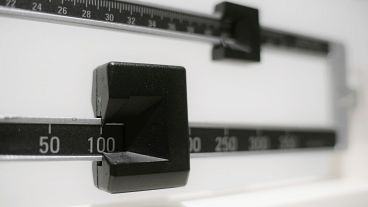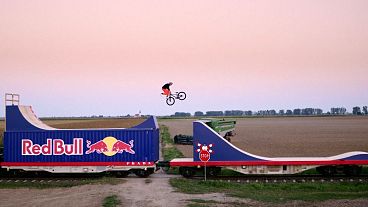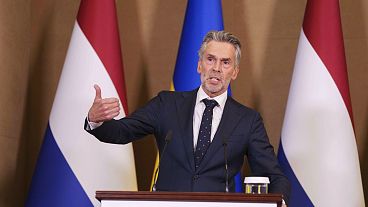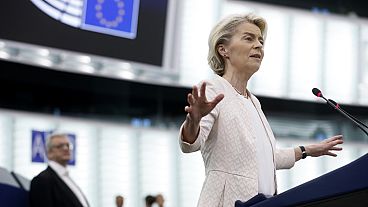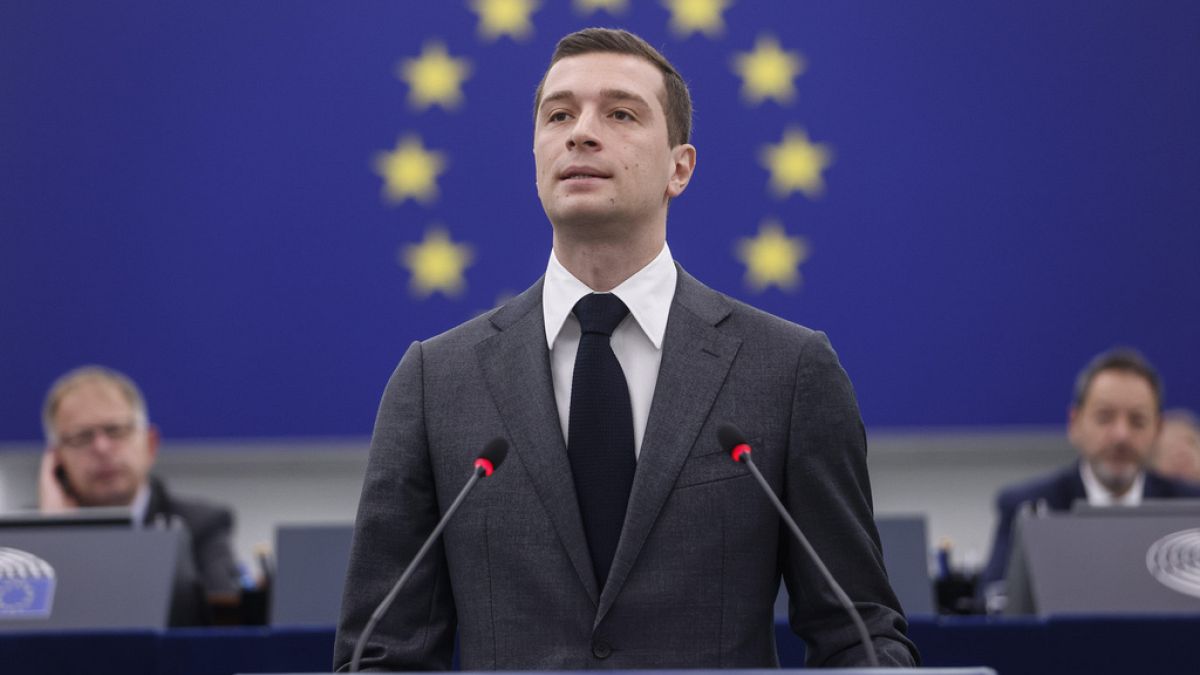During his time in the European Parliament, the French MEP and president of the Patriots for Europe group has voted against a resolution on EU support for Ukraine, the pact on migration and asylum and the European health pass.
Although he has kept a low profile since the defeat of his National Rally (RN) party in France's early parliamentary elections in July, Jordan Bardella, who once saw himself as prime minister, will soon be back in the European Parliament.
Re-elected in June for a second term as an MEP, Bardella is now the chairman of the new far-right Patriots for Europe group.
His parliamentary activities, votes and statements will therefore face heavy scrutiny, but how has he voted so far in Strasbourg and Brussels? We take a closer look at his votes on a number of key initiatives.
Support for Ukraine
This was the first resolution passed by the European Parliament in Strasbourg following the European elections in June.
On 17 July, the resolution in support of Ukraine was adopted by a large majority, with 495 votes in favour, 137 against and 47 abstentions. Bardella voted against the text, which called on the European Union to step up its support for Ukraine against Russia's war of aggression.
"We do not agree that each member state should, as a matter of principle, devote 0.5% of its GDP per year to support for Ukraine, which for France is equivalent to €7 billion per year," he told the plenary session during a debate on the need for continued EU support for Ukraine.
The president of the new far-right Patriots for Europe group said he was against "the delivery of weapons that could strike directly at Russian territory", and Ukraine's entry into NATO, on the grounds that they would, in his view, "increase the risk of escalation with a nuclear power".
The MEP also opposed Ukraine's entry into the European Union, as proposed in the resolution, on the grounds that it would "threaten the survival of our economy and our agriculture by seriously unbalancing the common agricultural policy".
While Bardella has smoothed over his views on Russia following the full-scale invasion of Ukraine, the National Rally's ambiguous links with Moscow are regularly criticised. In 2014, the party took out a €9.4 million loan from First Czech Russian Bank.
Ceasefire in Gaza
Since Hamas's terrorist attack on 7 October, which killed nearly 1,200 people in Israel, the National Rally has aligned its positions with those of Israeli Prime Minister Benjamin Netanyahu.
It has even gone so far as to present itself as the leading supporter of people of the Jewish faith, to divert any accusations of antisemitism previously levelled against the party.
Less than two weeks after the attack, Bardella and other MEPs tabled a motion for a resolution on the "despicable terrorist attacks by Hamas against Israel", "Israel's right to defend itself in accordance with humanitarian and international law" and the humanitarian situation in Gaza.
The text reaffirmed "Israel's right to exist" and called for the payment of any EU funds to Palestinian organisations, in particular the Palestinian Authority and UNRWA, "to be immediately suspended".
Bardella did, however, vote in favour of a non-binding resolution calling for a permanent ceasefire in the Gaza Strip and a restart of the peace process.
The resolution was adopted by the European Parliament on 18 January by 312 votes to 131, with 72 abstentions. MEPs set the immediate release of the hostages held by Hamas in Gaza as a precondition for a ceasefire.
Faced with their inability to impose a permanent ceasefire, the European Union and the international community have since been accused of impotence and weakness, while Israel's military response in Gaza in retaliation for the 7 October attack has killed more than 40,000 people, mainly women and children.
New pact on migration and asylum
On 10 April, the European Parliament gave the green light to the 10 legislative texts making up the Pact on Migration and Asylum, presented by the European Commission in September 2020.
This overhaul of the EU's migration and asylum policy system provides for faster processing of asylum applications, the relocation of asylum seekers between member states, the screening of third-country nationals at the EU's external borders, a better response in the event of a crisis and the registration of data on people arriving in the EU illegally.
On his side, Bardella gave an assurance that the RN would "oppose this submergence pact with all its might" in a statement issued on the sidelines of the vote.
"At a time when mass immigration is becoming an existential challenge that is only in its infancy and now poses a threat throughout Europe to our security, our identity and the stability of our societies, the European Union is choosing the path of weakness and air draughts", Bardella said in the statement.
While he voted against most of the texts making up the pact on migration and asylum, Bardella did vote in favour of the Eurodac regulation introducing the recording of data on people arriving irregularly in the EU, including fingerprints and facial images, from the age of six.
European Green Deal
"What are the results of the Green Deal? Thousands of angry farmers, taken to the streets because they can no longer work and make a living from their efforts!" blasted Bardella at a campaign meeting for the European elections in Montbéliard in eastern France in March.
"The Macronists have pursued a policy of degrowth for the past seven years, submitting to the objectives of the Green Deal, which advocates lowering agricultural yields and the number of livestock," he said again on X in February, from the Paris International Agricultural Show. "Those who defend France's agricultural power are the National Rally."
The European Green Deal is the European Commission's environmental compass. Its main objective is for the European Union to achieve climate neutrality by 2050.
In July 2021, the European Commission presented a set of proposals for the EU to reduce its greenhouse gas emissions by 55% compared to 1990 levels by 2030.
A key text in the European Green Deal, the Nature Restoration Act, requires the restoration of 20% of EU land and marine areas and 30% of habitats in poor condition (forests, grasslands, wetlands) by 2030.
Bardella, who regularly denounces a "punitive ecology", voted against the measure.
He also voted against ending the use of new diesel and petrol cars by 2035; against the new target of 42.5% renewable energy in the European energy mix by 2030; against halving the use of pesticides (which was rejected by the European Parliament); and against reducing packaging waste.
However, he abstained from voting on the introduction of a border carbon tax.
Artificial Intelligence Act
This is the world's first regulation of AI. The Artificial Intelligence Act was adopted by the European Parliament in March with 523 votes in favour, 46 against and 49 abstentions. Bardella was among those voting in favour.
A historic step forward in reducing the risks of AI on European soil while guaranteeing innovation, the legislation notably limits the use of biometric identification systems by law enforcement agencies and bans the use of a social credit system, notably used in China.
A few weeks later, before the EU elections, Bardella spoke at France's largest employer federation, Medef, and said: "When it comes to digital issues, we can't just be satisfied with regulation".
He called for the EU to catch up to global partners on artificial intelligence through "cheap energy", "a favourable framework for start-ups" and "an increase in our R&D budget".
European recovery plan
Although MEPs were not asked to vote directly on the European recovery plan for 2021, they did give the green light to the financial mechanism that will make it possible: the Recovery and Resilience Facility.
To help EU countries cope with the consequences of the COVID-19 pandemic, this instrument has pledged an envelope of €750 billion (or the equivalent of €806.9 billion in 2022) in the form of grants and loans, including €40 billion for France.
These funds, which have been partly disbursed to date, are intended to finance the ecological transition, digital transformation and crisis preparedness.
The European Parliament adopted this text in February 2021 with 582 votes in favour, 40 against and 69 abstentions. National Rally MEPs, including Bardella, abstained, denouncing what they saw as too high a cost for France and a loss of sovereignty for member states.
"The recovery plan touted by Valérie Hayer [chair of the Renew Europe group] means that France will receive €40 billion, but will have to repay at least €80 billion," said Bardella on X in May, during the European election campaign.
Repayment of the joint loan is due to begin in 2028. It will be spread over 30 years, until 2058. To this end, the European Union plans to increase its budgetary revenue via a tax on non-recycled plastic packaging, for example.
It is still too early to determine the amounts that each member state will have to reimburse, according to economists.
European Health Pass
A year after the start of the COVID-19 pandemic, Bardella fully opposed the creation of the European Health Pass in the name of a supposed "fight for freedoms".
Approved on 8 June 2021 by the European Parliament with 546 votes in favour, 93 against and 51 abstentions, the European Health Pass was intended to facilitate and secure travel, particularly between member states, during the COVID-19 pandemic.
It took the form of a digital or paper QR code to prove vaccination status.
It came into force in all member states on 1 July 2021 and was subsequently extended until June 2023.
Right to abortion
Following the suppression of the constitutional right to abortion by the US Supreme Court in July 2022, the European Parliament adopted a non-binding resolution on the right to abortion.
On 7 July 2022, MEPs expressed their wish to include the right to abortion in the EU Charter of Fundamental Rights. Like all RN MEPs, Bardella was absent from the vote — a sign of the party's fragmentation on this issue.
The French Parliament gave the go-ahead for "the guaranteed freedom of women" to have an abortion to be introduced to the French constitution on 4 March. While some RN-elected representatives voted in favour, others voted against, and some abstained.
'Bardepalla'
Regardless of how he has voted in the past, the French MEP is regularly accused of being conspicuously absent from the European Parliament, to the point of being nicknamed "Bardepalla" by his critics.
It's a play on Bardella's name that roughly translates from French as "Bardella is not here".
"I have one of the best attendance rates of all French MEPs, with 94% attendance at votes", Bardella retorted on 17 April on French TV.
In an article published in April, French newspaper Libération asserted that the 94% figures needed to be put into context.
Firstly, this percentage places Bardella 61st out of 79 French MEPs in terms of attendance.
Libération also pointed out that this figure only reflects the attendance of MEPs at plenary sessions.
MEPs tend to attend plenary sessions because their daily allowance of €350 is halved if they don't take part in votes. However, this is not the case for committee work.
The newspaper also pointed out that votes and debates in the plenary represent only a tiny part of parliamentary work.
If we look at his other parliamentary activities during the 9th parliamentary term (2019-2024), Bardella was not the rapporteur for any report and signed only one report as shadow rapporteur, according to the assistEU platform.
He also submitted 156 written questions and 760 explanations of vote. However, these figures are not reliable indicators of his parliamentary work either, as his parliamentary assistants could have been responsible for drafting them.
Lastly, although he made 76 speeches in plenary, he was more likely to be called upon to speak because of his past status as vice-chairman of the Identity and Democracy parliamentary group, Libération added.
It remains to be seen how these indicators will evolve during his new term of office.

